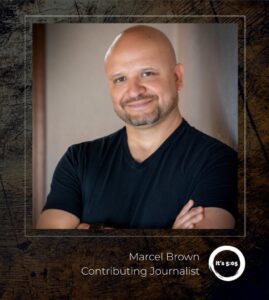October 2, 2023

In this Episode:
Marcel Brown: October 1st, 1982. The first commercial compact disc player, the Sony CDP-101, goes on sale in Japan. At a list price of 168,000 yen, this would have been approximately 730 US dollars. It was later introduced worldwide in March of 1983.
Edwin Kwan: A fake Bitwarden password manager lookalike site is distributing malware to unsuspecting visitors. The Bitwarden password manager has increased in popularity lately and with a growing user base, the software and its users are becoming a popular target for cybercriminals.
Katy Craig: Is your privacy at risk? Intelligence agencies are diving headfirst into the world of open-source data and it’s stirring up some serious concerns.
Hillary Coover: Can artificial intelligence rig elections? The sooner we anticipate and prepare for these challenges, the better equipped we’ll be to safeguard the integrity of elections worldwide.
The Stories Behind the Cybersecurity Headlines
Edwin Kwan
Fake Bitwarden Website Serving Malware to Windows Users
 A fake Bitwarden password manager lookalike site is distributing malware to unsuspecting visitors.
A fake Bitwarden password manager lookalike site is distributing malware to unsuspecting visitors.
This is Edwin Kwan from Sydney, Australia.
The fake website is a very convincing lookalike to the real Bitwarden site, and has a typosquat domain name to fool potential victims. It is believed that phishing campaigns through Google ads were used to target potential victims.
The fake website is only targeting Windows users. Users trying to download the Linux or Mac version are redirected to the official software download page. Researchers discovered that the fake Bitwarden installer is a malicious .NET executable that is a remote -access trojan with information-stealing features.
The Bitwarden password manager has increased in popularity lately and with a growing user base, the software and its users are becoming a popular target for cybercriminals.
Users should only download software directly from the trusted source and to always check the domain hosting software downloads against the domain belonging to the official website.
Resources
– https://www.bleepingcomputer.com/news/security/fake-bitwarden-sites-push-new-zenrat-password-stealing-malware/
– https://www.proofpoint.com/us/blog/threat-insight/zenrat-malware-brings-more-chaos-calm
Katy Craig
SpyGPT
 Is your privacy at risk? Intelligence agencies are diving headfirst into the world of open-source data and it’s stirring up some serious concerns.
Is your privacy at risk? Intelligence agencies are diving headfirst into the world of open-source data and it’s stirring up some serious concerns.
This is Katy Craig in San Diego, California.
Today we explore the CIA’s plans to introduce an AI tool reminiscent of OpenAI’s ChatGPT and the growing debate over the potential threats to your personal information, including sensitive data like your location. Your privacy might be hanging in the balance.
Randy Nixon, Director of the CIA’s Open-Source Enterprise Division, acknowledges the immense volume of data collected, which includes personal and location details. Privacy advocates worry that accessing large, unregulated commercial data marketplaces for purchasing such information could infringe on individuals’ privacy rights.
The Office of the Director of National Intelligence has voiced concerns over intelligence agencies’ reliance on these marketplaces, highlighting the need for robust privacy safeguards. The potential for misuse of personal data remains a pressing issue, as intelligence agencies seek to harness open source information for national security purposes.
While AI tools offer advanced capabilities and data analysis, the ethical and legal implications of using such tools to access and process personal information require careful consideration.
Striking a balance between effective intelligence gathering and safeguarding individuals’ privacy rights is a critical challenge faced by intelligence agencies in the era of open-source data.
This is Katy Craig. Stay safe out there.
Hillary Coover
AI Election Disinformation
 Can artificial intelligence rig elections?
Can artificial intelligence rig elections?
Hi, this is Hillary Coover in Washington, DC.
Harvard’s cybersecurity expert is raising alarms about the use of AI in election-related propaganda campaigns. Foreign actors have increasingly employed social media disinformation tactics in elections worldwide since 2016, with China and Iran following Russia’s lead.
The new twist is the emergence of generative AI and large language models like ChatGPT and GPT-4, which can effortlessly generate vast amounts of text in various tones and perspectives. These tools are uniquely suited for modern internet-era propaganda and bring the cost of foreign influence operations significantly down.
Distribution remains a critical challenge for propagandists, but the landscape is evolving. Companies like Meta are improving at identity and removing fake accounts, but propaganda outlets are adapting by moving to messaging platforms like Telegram and WhatsApp, making them harder to detect. TikTok, controlled by China, is also emerging as a platform for AI-generated short videos.
Additionally, generative AI enables new techniques, such as persona bots. These seemingly normal social media accounts occasionally share political content, and when deployed in large numbers, they can have significant impact.
To counter these evolving threats, It’s crucial to identify and catalog AI-produced propaganda tactics now. Researchers must study techniques employed in other countries to better defend their own. Unfortunately, some researchers are facing targeting and harassment hindering their efforts.
While not all elections have faced significant disinformation issues in the generative AI era, understanding potential threats is vital. The sooner we anticipate and prepare for these challenges, the better equipped we’ll be to safeguard the integrity of elections worldwide.
Marcel Brown
This Day, October 1-2, in Tech History
 This is Marcel Brown with some technology history for October 1st and 2nd.
This is Marcel Brown with some technology history for October 1st and 2nd.
October 1st, 1982. The first commercial compact disc player, the Sony CDP-101, goes on sale in Japan. At a list price of 168,000 yen, this would have been approximately 730 US dollars. It was later introduced worldwide in March of 1983.
October 2nd, 1955. Considered the world’s first fully electronic computer, after 11 years of continuous service, the ENIAC computer was retired. It’s funny how today a computer that’s a few years old is considered obsolete. I guess they just don’t make them like they used to.
That’s today’s tech history, for more, tune in tomorrow and visit my website at thisdayintechhistory.com.
Resources
– http://thisdayintechhistory.com/10/01
– https://thisdayintechhistory.com/10/02










